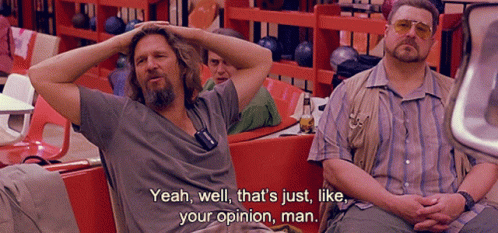Le client n’a jamais tort. Do you know the phrase? It’s the fancy French way of saying, “The customer is always right.” It’s a pretty straightforward sentiment: to provide good customer service you do what the customer wants, even when you don’t think it’s a great idea. Customer wants ketchup on their steak? Fine, here’s the ketchup. Customer wants sugar in their coffee? Sure, it’s your nickel. Customer wants their house painted puke green? Great choice, here’s the paint.
I once had a customer for whom I bent over backwards in a futile attempt to please. They promised a short and easy shoot and delivered neither.1
That customer is no longer my customer because of another aphorism: no good deed goes unpunished. I think I want this one carved on my headstone.
I reduced my rate, stayed after hours, and generally bent over backwards to provide this sadist with a helluva deal because he’d been an occasional vendor. So I gave him the friends and family discount.
And then he punished me mercilessly for that kindness.
This is a mistake you (hopefully) only make once. Never extend the friends and family deal to anyone who isn’t friend or family. Because no good deed goes unpunished, I stood there listening to the tick of the clock while this guy stared at his products, trying to decide which one should go where, and preventing our shoot from moving forward. (These things were super simple—think socks, gray, white and blue socks, but not socks. There’s only so much you can do.) He turned something straightforward into a monument to another of my favorite sayings: perfect is the enemy of good. He spent so much time aiming for perfection that we ran out of time to get to decent. We simply could not complete this short, straightforward shot list in the allotted time.
So, being a glutton for punishment and total moron, I rescheduled for the following week.
I know! Stop yelling. I know.
As a certifiable genius, I also agreed to again stay well into the evening while my infant son waited at home, crying out for his beloved father.
Can you guess what happened next?
This man did the exact same thing.
Which brings us to another great phrase: same shit, different day.
Paralyzed with indecision, my guy stood and stared at his products for significantly more time than any reasonable person ever could. He stood and he stared, he stared and he stood—silently, frozen—trying to decide what he wanted to do and never making a decision. Meanwhile I paced the studio listening to my heartbeat.
What was I to do? After all, the customer is always right.
It turns out, as many of you may be aware, that is not the full saying. The original contains a few more words that provide crucial context. It actually goes, “The customer is always right in matters of taste.”
That changes everything, don’t you think?
Even with the addendum, though, this seems like a flawed philosophy when it comes to photography, or really any creative endeavor. And although I’ve been practicing professionally for 20 years, I’m not sure what to do about it.
As a longtime colleague says, our customers hire us for our taste. I think that’s quite true. So what happens when the customer’s taste differs from our own?
When a customer says, “I do not like how this photo looks…” What do you do now? That determination is an opinion, after all. Assuming you the photographer were not negligent, the customer is well within their right to not like the photograph they have commissioned you to make. This is true whether they are the subject of a portrait, the art director overseeing a product shot, or the editor who has sent you to cover a particular story. If they don’t like it… That’s it. They aren’t wrong and there’s nothing you can do to change their mind. This is where yet another saying comes into play: There’s no accounting for taste.
I used to hear this phrase bandied about and I always took it to mean something simple like, “Well, people like different things, so what can you do?” followed by a dismissive shrug. But I have come to realize the key to that phrase is the word accounting—as in, add it up, debits and credits, a ledger to determine a “correct” answer. There is no “accounting” for taste, which means if someone doesn’t like something, that’s it. It’s their right. Even if everyone else disagrees, they cannot be proved wrong.
Because there is no accounting for taste, sometimes our tastes simply do not align and a client does not like what you have created for them, how you have depicted their product, or the puffy, swollen, old and tired face you have rendered in their portrait.2
So what do you do when your client, or your portrait subject, or the benefactor of your art simply decides they don’t love what you made? Worse, what if they use such an opinion to decide they would like to pay you nothing or have you do it again for free? Even in the best case scenario, in which they pay and go away unhappy and stop being your customer, this is not a particularly ideal outcome.
The same challenge is true of any creative endeavor. You can disagree with your hairstylist about how they’ve made you look. And you can tell the chef you think she used too much garlic. Good customer service tends to dictate they should smile, apologize, and remove it from the bill.
What if the thing the customer doesn’t like is not your work, or the garlic, or the cost, or the general vibe of the images? What if what the customer doesn’t like is themself?
As every portrait photographer knows, we are playing with fire. We use hair and makeup and wardrobe and lighting and reflectors and more lighting and post processing and more retouching and pull out all the stops to make a great portrait. And while we get there most of the time, sometimes our subjects only see the things they hate about themselves. The laugh lines or puffy eyes, the crooked eyebrow or the angle of that earlobe. Whatever it may be, they choose a lesser photo, one that hides the thing they hate most, even if it makes them look like a dead-eyed stiff or a serial killer. They make a bad choice because their taste, in such instances, cannot be trusted. You know it, I know it, and everybody else knows it, but they don’t know it and they can’t know it. It’s all but impossible, literally a blind spot. No matter how much you suggest and cajole and plead, it’s their nickel and they’re going to like what they like. Because no good deed goes unpunished and the customer is always right and there’s no accounting for taste.
Sometimes a customer is rude because they’re frustrated about not looking as young or thin or attractive as they once did. It doesn’t excuse it but it does explain it. Most customers are understanding of this as well, but anyone who has ever worked retail knows you can’t count on the collective good sense of a large enough customer base.
The reasonable ones, I find, say things like “I didn’t like my hair that day,” or “I wore the wrong jacket.” For these lovely people I’m happy to offer a reshoot at half price. In practice this weeds out the ones who are just overly critical and don’t really object to the look of their headshot that much. For the ones who are truly mortified, the ones confident they can do better? Don’t tell anybody, but I’ll often waive their reshoot fee. I’m not a monster.
Your doctor’s office isn’t likely to charge a cancellation fee if you don’t give them 24 hours notice. If they do, realize it’s their way of saying “We no longer want you as a customer.” What that policy does, of course, is allow them to charge the people who no-show on multiple occasions, incentivizing them to have basic decency and not continually waste other people’s time.
A client once emailed me ten minutes before her scheduled portrait time. I was half expecting it because she’d already postponed twice. But this time she said something new. “I’m in Toronto,” she wrote. “I can’t make it.” She could have saved me quite a bit of prep work with a heads up 60 or 90 minutes prior to her session. Given that she was roughly 1,000 miles away with no possible chance of being here, I was irritated. Had she inadvertently teleported across the continent within the last hour? Doubtful. So I never responded to her message and I never heard from her again. Fine with me. When people tell you who they are, believe them. (That’s another good one!)
A photographer recently rented our studio to do her own “no good deed goes unpunished” portrait session for a friend of hers. It was designed to be a bit of a pick-me-up after some tumult in the portrait subject’s personal life, and so no expense was spared in terms of hair, makeup, lighting, the works. The client was less than enthused with the preview shots she saw in studio, not because the photographer didn’t do her job but because the subject had unrealistic expectations and simply wasn’t particularly happy with how she looked. I thought the photographer did her a lot of favors. But to the subject it wasn’t enough. Nothing short of miracles would have been.
I heard from the photographer a week later. Turns out when the subject saw the proofs she hated them. She said enough, in fact, to make the photographer—her friend—cry. So when the photographer asked about booking another studio rental, for a second session to try to please her un-pleasable friend, I offered it at no charge. It sucks enough to redo a shoot. To lose money on such a torturous gig? That I cannot abide.
I saw the proofs, by the way. The subject looked great. Better than real life and certainly a lot more fun. It’s not fair that the photographer has to re-do work to try to make a difficult client happy, but what can you do? Because, of course, the customer is always right. And no good deed goes unpunished. And there’s no accounting for taste. And same shit, different day.
It all comes down to opinion.
That reminds me of another saying, actually. I don’t remember the exact wording, but it’s something along the lines of “Opinions are like…” Oh, I forget. But everybody’s got one. Or maybe everybody is one? I don’t remember exactly. But I’m absolutely certain it’s 100% true.
This is all hypothetical, of course. I have been instructed by legal counsel to point out that I am in no way speaking from personal experience. But if I was…
When I’m feeling malicious in such instances, I like to say with a big smile, “Well, it’s not an oil painting!” People don’t tend to find that as amusing as I do.







Oh gosh, I have definitely had a version of this experience; I didn't have to reshoot, only suffer through weeks of the client emailing me all the ways I wasn't using Photoshop correctly while he simultaneously violated the terms of our contract. There's no one right answer to these situations, I think: sometimes you can afford (not just in the monetary sense) to walk away, and sometimes you can't.
Brilliant! And fun. Your studio renter should not have done the re-shoot I think. Sounds like a friendship that should be allowed to expire.